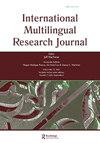“Maybe not 100%”: Co-constructing language proficiency in the Maya diaspora
IF 2.1
1区 文学
Q2 EDUCATION & EDUCATIONAL RESEARCH
引用次数: 2
Abstract
ABSTRACT Language learning and the development of language proficiency are central concerns in the study of immigrant adaptation. This paper analyzes the social construction of language proficiency among Indigenous Guatemalan Maya youth in the United States– specifically, undocumented young adults who migrated to Los Angeles, California as unaccompanied minors and who grew up as low-wage workers. Our analysis shows that youth used “percentage talk”– i.e., construing current proficiency as apercentage of idealized full proficiency– as a discursive strategy to assess their language ability and level of social adaptación (adaptation) relative to native English and Spanish speakers, other Indigenous language speakers, and their past selves. Through percentage talk, youth wrestled with social stratification and inequality in the U.S. and Guatemala and imagined themselves as future members of Spanish- and English-oriented discourse communities. While outwardly individualistic, percentage talk also allowed youth to gauge their ability to support the language socialization and social incorporation of other L1 Maya speakers in diaspora. Youth’s tricultural adaptation and contestation of an all-or-nothing ideology of proficiency shows their nuanced understanding of the role of language in immigrant socialization.“也许不是100%”:共同构建散居在外的玛雅人的语言能力
摘要语言学习和语言能力的发展是移民适应研究的核心问题。本文分析了美国危地马拉玛雅土著青年的语言能力社会结构,特别是作为无人陪伴的未成年人移民到加利福尼亚州洛杉矶的无证年轻人,以及作为低工资工人长大的年轻人。我们的分析表明,年轻人使用“百分比谈话”——即将当前的熟练程度理解为理想化的完全熟练程度的百分比——作为一种话语策略,来评估他们的语言能力和相对于母语为英语和西班牙语的人、其他母语为土著语言的人以及他们过去的自我的社会适应水平。通过百分比谈话,年轻人与美国和危地马拉的社会分层和不平等作斗争,并将自己想象成西班牙语和英语话语社区的未来成员。虽然表面上是个人主义的,但百分比谈话也让年轻人能够衡量他们支持散居海外的其他母语玛雅人的语言社会化和社会融合的能力。年轻人对要么全有要么全无的熟练意识形态的三文化适应和争论表明他们对语言在移民社会化中的作用有着微妙的理解。
本文章由计算机程序翻译,如有差异,请以英文原文为准。
求助全文
约1分钟内获得全文
求助全文
来源期刊
CiteScore
4.10
自引率
4.80%
发文量
19
期刊介绍:
The International Multilingual Research Journal (IMRJ) invites scholarly contributions with strong interdisciplinary perspectives to understand and promote bi/multilingualism, bi/multi-literacy, and linguistic democracy. The journal’s focus is on these topics as related to languages other than English as well as dialectal variations of English. It has three thematic emphases: the intersection of language and culture, the dialectics of the local and global, and comparative models within and across contexts. IMRJ is committed to promoting equity, access, and social justice in education, and to offering accessible research and policy analyses to better inform scholars, educators, students, and policy makers. IMRJ is particularly interested in scholarship grounded in interdisciplinary frameworks that offer insights from linguistics, applied linguistics, education, globalization and immigration studies, cultural psychology, linguistic and psychological anthropology, sociolinguistics, literacy studies, post-colonial studies, critical race theory, and critical theory and pedagogy. It seeks theoretical and empirical scholarship with implications for research, policy, and practice. Submissions of research articles based on quantitative, qualitative, and mixed methods are encouraged. The journal includes book reviews and two occasional sections: Perspectives and Research Notes. Perspectives allows for informed debate and exchanges on current issues and hot topics related to bi/multilingualism, bi/multi-literacy, and linguistic democracy from research, practice, and policy perspectives. Research Notes are shorter submissions that provide updates on major research projects and trends in the field.

 求助内容:
求助内容: 应助结果提醒方式:
应助结果提醒方式:


